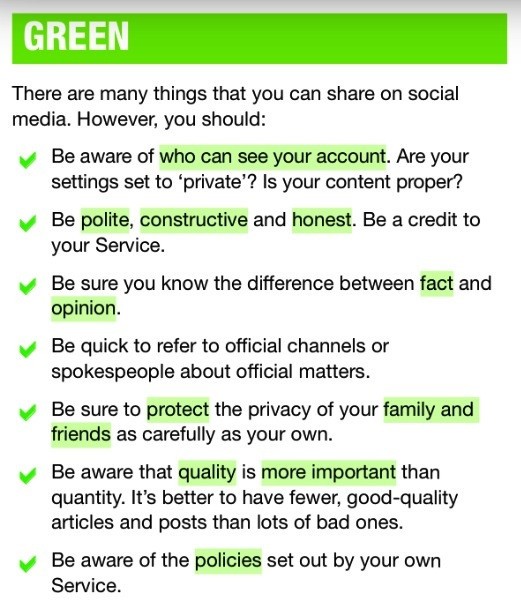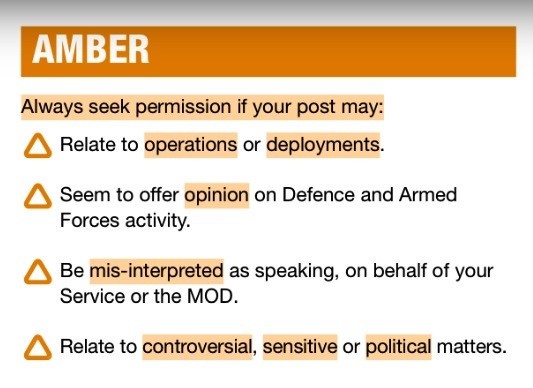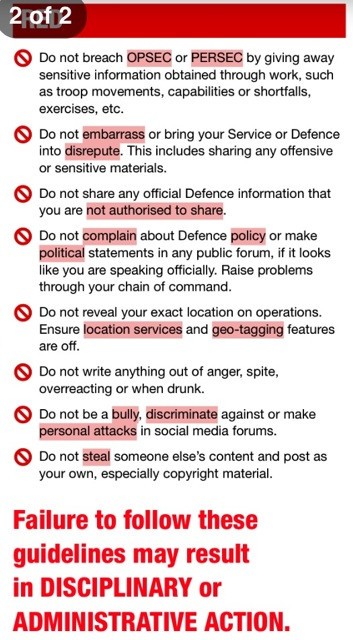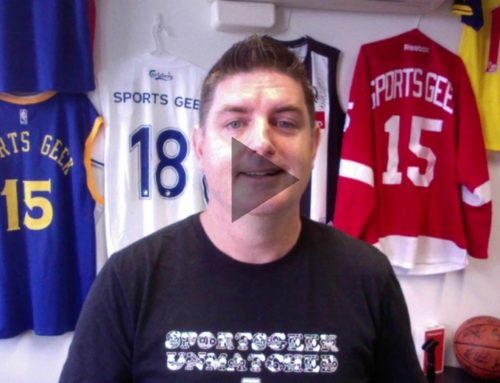On the 7th of June a tweet went out from @soldierUK providing servicemen and women a simple guide to follow regarding online behaviour. There are three categories which the guide followed; Green, Amber and Red. The guide is specifically related to military content and reducing the risk of sensitive service information being published online.
I'm a soldier, what information can I share on social media? GREEN http://t.co/DAmEc2ng AMBER http://t.co/uVZZu5MW RED http://t.co/A99eE052
— SoldierUK (@SoldierUK) June 7, 2013
Let’s have a look at how the ‘unofficial’ online guide for the military can be adapted to a sporting organisation and its players and athletes.
GREEN: Be aware of what content you post!

Category ‘green’, is all about being aware of how your information/ posted content shared on social media affects the organisation, yourself, family and friends. This has been an issue for many athletes not thinking about ‘who can see their account’ and not protecting their own privacy. Earlier in the year we saw Josh Dugan stood down by the Canberra Raiders for posting a photo on Instagram of himself and Blake Ferguson drinking, the final straw for the club. This was followed weeks later by an abusive comment directed at a fan which resulted in the Brisbane Broncos pulling contract negotiations with Dugan. Would a similar summary such as the Green category be mandatory in all athletes’ houses?
Privacy
It’s important for athletes in particular to be aware of who can see their social media account. If an athlete’s settings are on private they to, still need to be sure that content posted is appropriate. For those who are public, due diligence needs to be taken prior to posting. Athletes need to be constantly aware of how others may view their posted content and interpret it in a positive or negative way; if they think it could go either way don’t post it.
Be Polite
Posts and content will reflect your personality, your likes and dislikes, and followers will be able to see this. That’s what has lead to the rapid growth in social media, is that sense of voyeurism which attracts use as humans to these different digital platforms. Portraying yourself as ‘Polite, Constructive and Honest’ is essential as followers will be given a glimpse into your world and in turn the organisation / team you represent.
Fact vs Opinion
Athletes and sports organisations need to be aware of the difference, as it can lead to misrepresented news and information. Twitter for example we see staff of organisations often explicitly display that their tweets are their own not that of the organisation they represent, but is that enough. If both parties do their research prior to posting content this would solve the problem. Social media is about the conversations you have with your followers and supporters and if the information is fiction or false it could potentially have a negative influence on followers as they may feel that this “official” post isn’t genuine.
Keep it official
This is a GREAT point which needs to be followed up with an effective process in place for athletes representing an organisation which have an established avenue, which IS NOT online, to ask questions about ‘official’ and private matters.
Protect privacy of family
Not only do posts affect the individual posting them but also their family and friends. Within social media athletes aren’t just representing themselves, the sporting team but also their family and friends whom which they engage with online. Being aware of when it its appropriate and necessary to mention them in a post is extremely important and the inclusion of ‘being as carefully as your own’ summaries that perfectly.
Quality Vs Quantity
Providing information through social media which reflects your likes and personality is a great way for athletes to connect with followers. Being aware of the necessary steps in portraying a positive brand goes along way for athletes through content posted.
Follow club rules
The final point would be included in a Teams social media guidelines as there would be a governing body which would have their own guidelines which players still need to follow and abide by.
AMBER: When in Doubt . . . . . ASK
The Amber category looks at when it is necessary to ask or seek permission prior to posting online. This is extremely important for an organisation such as the military which handles highly sensitive information, but can these guidelines be adapted to a sporting organisation?

Game Plans
Athletes and organisational staff need to be aware when posting content relating to procedures and processes, if it’s appropriate to post. An example would be if an athlete were to post information regarding plays or adjustments made before their game or competition. This information would be regarded as giving the team or opponent a competitive advantage and we all know how important that is (Bill Belichick 2007 ‘Spy-Gate’).
Keep company line
Opinions regarding the organisation from an athlete or staff member whether or not positive or negative should be kept to themselves. Posting comments online is not the avenue or platform to vent and we have seen many athletes do this. An Ohio State quarter back decided to tweet about how he came to college to play football and shouldn’t be attending classes, this resulted in him receiving a one game suspension.
Be very clear
This is point refers to posting content and explicitly making it known to followers that the information is either your own opinion or sourced from someone else which credit needs to be given. This is important for sporting organisations who report on numerous new sources for information and post the content online. For example quotes from player interviews need to accurate and not misconstrued.
Be politically correct and don't offend
This point speaks for its self and I believe it is a must for all social media guidelines. One case which comes to mind was during the London Olympics in which a Greek athlete posted a tweet which was seen as tasteless and racist. Greece’s Olympic Committee then saw it fit to expel the athlete from the games, making her the first due to social media use.
RED: Do not, Do not, Do not!
Category RED focuses on what definitely should not be posted at any time. A guide which explicitly outlines what shouldn’t be posted will greatly assist all parties (athletes and staff) of an organisation as there are now no grey areas where they can potentially go wrong with content posted online. This also holds them accountable to their actions as what is expected of them is clearly stated.

You could follow a tried and true rule Sean uses in athlete training, below:
Social media provides athletes and sporting organisations an opportunity to connect with followers and supports on a consistent on ‘real-time’ basis. As a result it is paramount that there are a set guidelines to follow which outline what is acceptable and unacceptable when it comes to posting content online. What we have seen from @soldierUK is a simple summary of those expectations broken into three colour coded categories as an easy to read guide. As we have shown these points aren’t just exclusively for the military and can be applied to a sports setting. From this we can see that no matter what the area of profession it is important that the brand image of an organisation is upheld by all employees, volunteers, contractors, athletes and everyone involved. Maybe a simple summary such as these colour-coded points maybe a solution to solve athletes posting inappropriate content online. For more on Social Media Guidelines checkout the previously posted Do's and Don'ts , with some great tips from players on their own social media guidelines they have given themselves. Let us know what you think could potentially safeguard an organisation and its athletes.Closing Thoughts:




